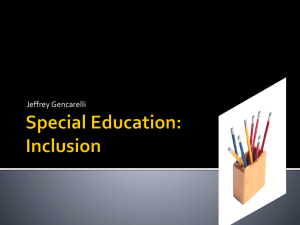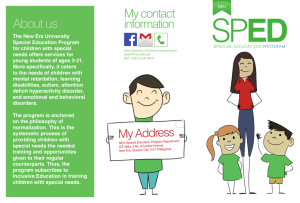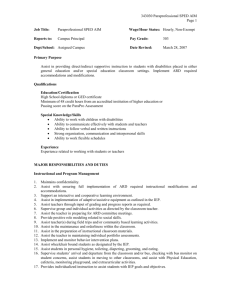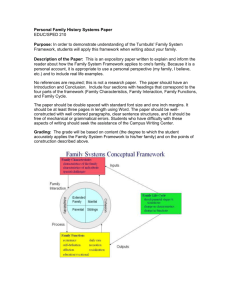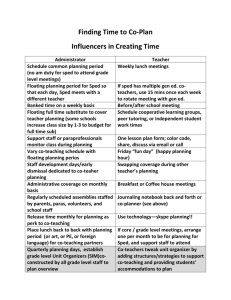Document 10822176
advertisement
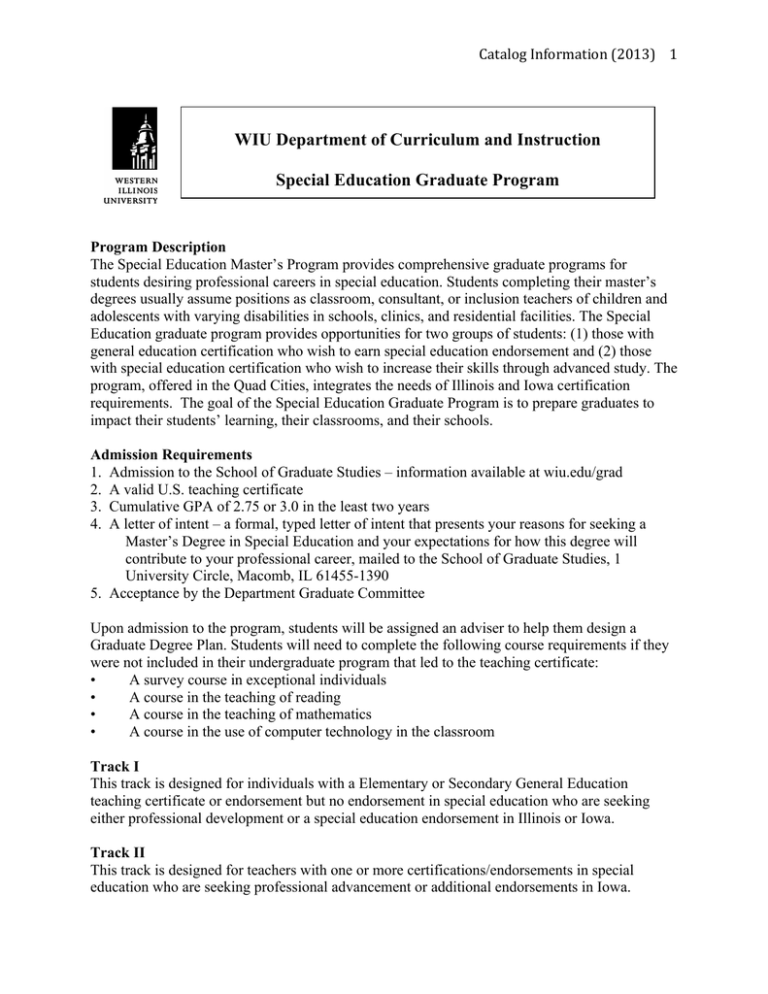
Catalog Information (2013) 1 WIU Department of Curriculum and Instruction Special Education Graduate Program Program Description The Special Education Master’s Program provides comprehensive graduate programs for students desiring professional careers in special education. Students completing their master’s degrees usually assume positions as classroom, consultant, or inclusion teachers of children and adolescents with varying disabilities in schools, clinics, and residential facilities. The Special Education graduate program provides opportunities for two groups of students: (1) those with general education certification who wish to earn special education endorsement and (2) those with special education certification who wish to increase their skills through advanced study. The program, offered in the Quad Cities, integrates the needs of Illinois and Iowa certification requirements. The goal of the Special Education Graduate Program is to prepare graduates to impact their students’ learning, their classrooms, and their schools. Admission Requirements 1. Admission to the School of Graduate Studies – information available at wiu.edu/grad 2. A valid U.S. teaching certificate 3. Cumulative GPA of 2.75 or 3.0 in the least two years 4. A letter of intent – a formal, typed letter of intent that presents your reasons for seeking a Master’s Degree in Special Education and your expectations for how this degree will contribute to your professional career, mailed to the School of Graduate Studies, 1 University Circle, Macomb, IL 61455-1390 5. Acceptance by the Department Graduate Committee Upon admission to the program, students will be assigned an adviser to help them design a Graduate Degree Plan. Students will need to complete the following course requirements if they were not included in their undergraduate program that led to the teaching certificate: • A survey course in exceptional individuals • A course in the teaching of reading • A course in the teaching of mathematics • A course in the use of computer technology in the classroom Track I This track is designed for individuals with a Elementary or Secondary General Education teaching certificate or endorsement but no endorsement in special education who are seeking either professional development or a special education endorsement in Illinois or Iowa. Track II This track is designed for teachers with one or more certifications/endorsements in special education who are seeking professional advancement or additional endorsements in Iowa. Catalog Information (2013) 2 Degree Requirements I. Core Courses for TRACK 1 and TRACK 2 ……………….....................................21 s.h. SPED 518: SPED 580: SPED 581: SPED 613: SPED 622: SPED 624: EIS 500: II. Self-Determination & Independence (3) Graduate Field Work in Special Education (3) SPED Law and Supervision (3) Leadership in Collaboration (3) Action Research in ED (3) Action Research Project (3) Methods of Research (3) Choose one of the following tracks: A. TRACK 1…………………………………………………………………………...16 s.h. For Elementary or Secondary teachers seeking education or endorsement in Special Education. SPED 517: Behavior Intervention (3) SPED 519: Psychoeducational Assessment (4) SPED 551: Characteristics of Learners with Mild/Moderate Disabilities (3) Two of the following SPED Methods Courses: SPED 523: Instructional Methods: Moderate/Severe Intellectual & Developmental Disabilities (3) SPED 526: Instructional Methods: Intellectual & Developmental Disabilities (3) SPED 536: Instructional Methods: Emotional/Behavioral Disorders (3) SPED 546: Instructional Methods: Learning Disabilities (3) SPED 552: Instructional Methods for K-6 Learners with Disabilities (3) SPED 553: Instructional Methods for Secondary Learners with Disabilities (3) SPED 556: Methods in Autism and Language Disorders (3) B. TRACK II…………………………………………………………………..............15 s.h. For Special Education teachers seeking advanced education or additional endorsement in Special Education. SPED 505: Diagnostic Assessment for Program Planning (3) SPED 600: Seminar in Curriculum (3) SPED 617: Advanced Behavioral Intervention (3) Two of the following SPED Methods Courses: SPED 523: Instructional Methods: Moderate/Severe Intellectual & Developmental Disabilities (3) SPED 526: Instructional Methods: Intellectual & Developmental Disabilities (3) SPED 536: Instructional Methods: Emotional/Behavioral Disorders (3) SPED 546: Instructional Methods: Learning Disabilities (3) SPED 552: Instructional Methods for K-6 Learners with Disabilities (3) SPED 553: Instructional Methods for Secondary Learners with Disabilities (3) SPED 556: Methods in Autism and Language Disorders (3) TOTAL PROGRAM…………………………………………Track 1 = 37, Track 2 - 36 s.h. Catalog Information (2013) 3 Course Descriptions 505 Diagnostic Assessment for Program Planning. (3) Diagnostic assessment for IEP planning is mastered, along with progress monitoring approaches such as curriculum-based measurement and portfolios with rubrics. Prerequisite: SPED 519 or an equivalent norm-referenced testing course. 510 The Exceptional Individual. (3) Characteristics and implications for educational programming for students with a wide range of disabilities will be examined. Students who are teachers or seeking teaching certification should take SPED 551. 514 Collaboration in Special Education. (3) Collaborative skills necessary to participate effectively in interactions with other professionals and parents, as well as to supervise paraprofessionals, are mastered. Various co-teaching models are also explored. Prerequisite: A survey of exceptionalities course. 517 Behavior Intervention. (3) Strategies for providing positive behavioral supports to students on a classroom and individual basis are mastered. Prerequisite: A survey of exceptionalities course. 518 Self-Determination and Independence (3) This course will provide teachers with the content and skills needed to build self-determination and independence in students with disabilities. Content will include curriculum, instructional strategies, and philosophies related to career education, transition, assistive technology, and specialized equipment. Pre-Requisite: A survey of exceptionalities course. 519 Psychoeducational Assessment. (4) Measurement concepts and norm-referenced assessments are explored, and the application of the comprehensive special education evaluation process is mastered. Prerequisite: SPED 551 or equivalent. 523 Instructional Methods: Individuals with Moderate/Severe Intellectual and Developmental Disabilities. (3) Methods for developing and implementing educational programs for individuals with moderate to severe intellectual and developmental disabilities, 0-21, will be mastered. Prerequisite: SPED 551 or equivalent. 526 Instructional Methods: Individuals with Intellectual and Developmental Disabilities. (3) Teaching methodologies, instructional strategies, and materials for use in developing educational programs for students, 0–21, with mild intellectual and developmental disabilities will be mastered. Prerequisites: SPED 551 or equivalent, a reading methods course, and a math methods course. 533 Special Problems in Special Education. (1–4, repeatable) Content-specific offerings aimed at professional development of educators. Assignment completion required for grade. (Degree candidates may receive credit on degree program only with the permission of the Departmental Graduate Committee and the student's adviser.) 536 Instructional Methods: Individuals with Emotional/Behavioral Disorders. (3) Teaching methodologies, instructional strategies, and instructional materials for use in developing educational programs for students, 0–21, with emotional/behavioral disorders will be mastered. Prerequisites: SPED 551 or equivalent, a reading methods course, and a math methods course. 546 Instructional Methods: Individuals with Learning Disabilities. (3) Teaching methodologies, instructional strategies, and materials for use in developing educational programs for students aged 0-21 with learning disabilities will be mastered. Prerequisites: SPED 551 or equivalent, a reading methods course and a math methods course. Catalog Information (2013) 4 551 Characteristics of Learners with Disabilities. (3) The unique characteristics of a wide variety of learners with mild and moderate disabilities will be examined, along with their broad educational, behavioral, and emotional needs as related to educational programming. 552 Instructional Methods for K–6 Learners with Disabilities. (3) Effective teaching methodologies, instructional adaptations, and program delivery options for students with mild/moderate disabilities, K–6, are mastered. Prerequisites: SPED 551 or an equivalent, a reading methods course, and a math methods course. 553 Instructional Methods for Secondary Learners with Disabilities. (3) Effective teaching methodologies, instructional adaptations, and program delivery options for students with mild/moderate disabilities, 7–12, are mastered. Prerequisites: SPED 551 or an equivalent, a reading methods course, and a math methods course. 556 Methods in Autism and Language Disorders (3) Effective methods for building social communication, and academic skills for students with high functioning autism spectrum disorder and language disorders. Prerequisites: Graduate standing. 580 Graduate Field Work in Special Education. (1–12, repeatable to 12) Practicum experiences are provided under the supervision of an appropriately certified teacher in a setting providing instructional services to students with disabilities. Prerequisite: Prior departmental approval which calls for completion or concurrent enrollment in an appropriate methods course. 581 Special Education Law and Supervision. (3) Federal and state laws, along with case law, that direct the delivery of special education services will be examined. Elements of supervision will also be outlined. Prerequisite: SPED 551 or an equivalent. 600 Seminar in Curriculum. (3) Investigation of research on best practices in developing and adapting curriculum and the impact on students with disabilities is required. The varying models that undergird curriculum and instructional approaches are examined with the aim of preparing leadership for school settings. Prerequisites: SPED 552 or SPED 553. 613 Leadership in Collaboration. (3) The unique social/emotional needs of families with children with disabilities and/or with children at-risk, the impact of poverty and other societal stressors, and the specific issues of diversity will be explored from a current research perspective with the aim of preparing informed leaders in educational settings. Prerequisite: SPED 551 or equivalent, or permission of the instructor. 617 Advanced Behavior Intervention. (3) Research-based approaches to positive behavior intervention will be examined with the intent of providing leadership for the establishment of school-wide environments based on positive behavior support for all learners. Prerequisite: SPED 517 or equivalent, or permission of the instructor. 622 Action Research in Education (3). Students master the principles of and strategies involved in conducting action research in school settings. Prerequisite: EIS 500 or evidence of appropriate course work in methods of research. 624 Action Research Project. (3) Students design, conduct, analyze, and report the results of an action research project related to their area of expertise. Prerequisites: SPED 622 and Graduate Committee approval.
